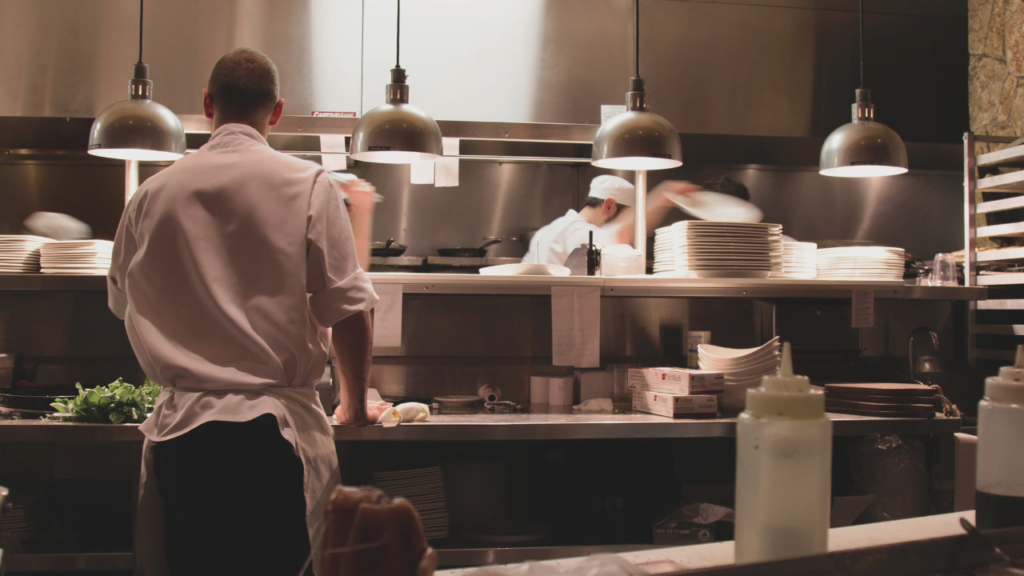Many of us have thought of starting a home-based business with minimum capital. One of the ideas we will discuss in detail is Cloud Kitchen. As the food industry changes, home-based cloud kitchens have become a good way for people in India who want to start their own business to make money.
These “virtual kitchens,” which are run out of people’s homes, meet the growing need for food delivery services online. We’ll discuss the necessary investments, possible growth, legal issues, profit margins, equipment needed, licenses needed, common mistakes to avoid, and ways to connect with delivery platforms.
Potential Growth
It is estimated that the Indian cloud kitchen market is expected to reach ₹64,400 Crore by 2025! This figure can boost you to start a home-based cloud kitchen and earn a decent amount, if done wisely, offering delicious food, efficient delivery, and competitive pricing.
Investment Requirements
Compared to a brick-and-mortar restaurant, home-based cloud kitchens require significantly lower investment. Here’s a breakdown of the essentials:
- Registration (Sole Proprietorship/LLP): ₹500 – ₹2,000
- Kitchen equipment: ₹50,000 – ₹1,00,000 (depending on menu and your niche food)
- Packaging materials: ₹5,000 – ₹10,000
- Delivery platform subscriptions: Variable (monthly fees)

Legal Requirements
There are few legal requirements you need to fulfill before starting a full fledged cloud-kitchen.
- FSSAI Registration: Mandatory for any food business. Registration costs vary based on business size. You can find many consultants who can help you in getting it. But, I would advise you to keep hygiene very important for your business and customer’s health. Just getting a license, hygiene in your business won’t come unless you focus on it.
- Municipal License: check if any license required as per your State requirements. It varies from state to state. As you are starting commercial activity in a residential area.
- GST Registration: It is required from the first day as there is no threshold limit when you are onboarding on delivery platforms like Swiggy or Zomato. However, there is a threshold limit of ₹20 lakhs. Apply online – gst.gov.in, free of cost.
Remember: Place full business name and address with GSTIN and FSSAI No on a big banner or board outside your business premises or home. It is a legal requirement otherwise you may be penalized or GST registration may get canceled too.
Hurdles to Overcome
- Find Niche: Focus on your speciality and what you can offer the best to your customers. Don’t start with a big menu, instead slowly grow by focusing on your strength.
- Find the best location: check what can be best sold in your area, what type of food or menu can bring revenue to your business. Otherwise, you will have to establish your kitchen in the location where you can make a successful business. This will increase your capital.
- Competition: The market is getting saturated. Focus on a unique niche or exceptional quality to stand out. Find out the competitors and their reviews online to boost your business accordingly.
- Delivery Reliance: Delivery platforms charge commission fees (30-35%), impacting your profit margin. They reduce the cost when your business grows. You need to decide your food cost based on margin and your capital and monthly costs.
- Over dependence on chef: Sometimes, cloud kitchens become over-dependent on their chef which costs them badly when they leave. So, try to make a recipe in such a way it won’t affect taste when someone leaves your food business. It won’t be possible in the initial days, but slowly try to fix the recipe and taste of your foods.
- Space Constraints: Working from a home kitchen has limitations. So, don’t mess up with too many food items, focus on your niche and single food items which you can sell the best.
- Ensure hygiene: maintain a clean workspace, and optimize your menu based on available space. Ensuring hygiene is a habit and also maintaining healthy business and healthy customers, where mostly fail.
Essential Equipment
- Cooking equipment: Gas stove, oven, refrigerator, mixer grinder (based on your menu)
- Food storage containers: Airtight containers to maintain freshness
- Packaging materials: Biodegradable containers, cutlery, and delivery bags
Integrating with Delivery Platforms
The successful cloud kitchen requirement is delivery and listing on online platforms like Swiggy and Zomato. But, you should be aware that they charge very high commissions ranging from 30-35% and the cost of food should be adjusted accordingly to make some profit.
Your costs should also include marketing, promotions and discounts so that you can run a cloud kitchen for a longer period. It is advisable not to run to open different outlets until you get profitable from your first home-based cloud kitchen.
Read this: Unbeatable Guidelines for Starting a Soft Toy Business
Conclusion
A cloud kitchen that you can start from home in India is a great way to turn your love of cooking into a business. You can get past the problems and find your place in this exciting market if you carefully plan, stick to quality standards, and use shipping platforms in a smart way. Remember that success depends on serving great food, running your business smoothly, and always putting the needs of your customers first.











1 Comment
View Comments